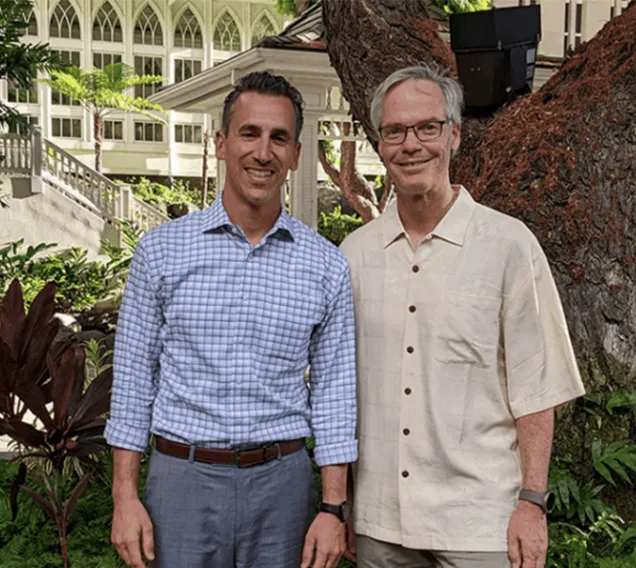January 3, 2023
AMA Interim Meeting 2023
Share this post

Ethan Lazarus, MD, FOMA, provided the following report to the OMA Board of Trustees after attending the November 2022 AMA Interim Meeting in Honolulu, HI.
AMA “Addressing Obesity” Policy Update #
We have scored a major home run for the field of obesity medicine.
As you recall, at the annual meeting, alternate delegate Anthony Auriemma, MD, JD, FOMA and myself submitted a resolution calling on our AMA to form an obesity task force (Resolution 415). This is a resolution I envisioned at the interim meeting back in 2018, but due to COVID-19, delayed submitting until the 2022 Annual meeting for a variety of reasons (virtual meetings, prioritization matrix which would not have allowed its consideration, etc.).
415 was met with resounding positive testimony and was ready to pass, until at the last second, the AMA Board requested that this item could be better addressed directly by the board, and it could implement the “Asks” of the resolution far more quickly without forming a task force. The board advised forming a task force could delay this process by a year or two (or longer) and they wanted to take a swing at this immediately.
The AMA Board has held up their end of the bargain. In October, the AMA Board passed policy implementing all of the items which we requested be assigned to the taskforce. It is now the official policy of the AMA, Policy D-440.954 “Addressing Obesity” that our AMA will (points are summarized):
- Assume a leadership role in collaborating with other interested organization to discuss ways to finance a comprehensive national program for the study, prevention and treatment of obesity, as well as public health and medical programs that serve vulnerable populations.
- Work with national specialty and state medical societies to advocate for patient access to and physician payment for the full continuum of evidence-based obesity treatment modalities including behavioral, pharmaceutical, psychosocial, nutritional and surgical interventions).
- Work with state and specialty societies to identify states where physicians are restricted from providing the current standard of care with regards to obesity and remove out of date restrictions.
- Leverage channels within the AMA to:
- Promote awareness that obesity is a treatable chronic disease along with evidence-based treatment options
- Advocate at the state and federal level with regards to obesity
- Health disparities, stigma and bias affecting people with obesity
- Lack of insurance coverage for treatments including lifestyle intervention, anti-obesity pharmacotherapy, and surgery
- Increasing obesity rates in children, adolescents, and adults
- Drivers of obesity including lack of healthful food choices and food marketing practices
- Conduct a landscape assessment that includes obesity prevention and treatment initiatives and medical education at all levels.
- Convene an expert advisory panel to counsel AMA on how to best leverage its voice and achieve the above objectives.
- That our AMA work with interested national medical specialty societies and state medical associations to increase public insurance coverage of and payment for the full spectrum of evidence-based adult and pediatric obesity treatment.
The full policy can be found here: https://policysearch.ama-assn.org/policyfinder/detail/obesity?uri=%2FAMADoc%2Fdirectives.xml-0-1498.xml
Obesity Caucus #
On November 13th, Dr’s Lazarus and Auriemma hosted an Obesity Caucus during the AMA meeting. Special guests included Dr. Alex Ding, AMA Board of Trustees, and Tom Easley, AMA Senior VP for Publishing and Mission Operations. Further, representatives from family medicine, endocrinology, bariatric surgery, pediatrics, maternal fetal medicine, Ob/Gyn and others were in attendance. This was an incredibly productive question and answer session giving all an opportunity to discuss this exciting board action and what it may mean for the future of obesity medicine.
Tom and Alex explained that the work on obesity will occur in 3 work streams over the next 12 to 15 months. It will start with an internal review looking at all policies, programs, content, education, health solutions, CPT code sets, JAMA network, AMA Ed Hub, etc. This should begin now and continue into the first quarter of 2023.
Second, the AMA will perform and external landscape assessment looking at issues such as coverage (or lack thereof), Medicare, Medicaid, private insurers, etc., looking at what is covered and what is not.
Third, the AMA will convene an advisory panel outside of AMA staff to advise on how to best leverage AMA resources to implement strategic programming and objectives around obesity, and how to best fit this into the AMA’s strategic plan. The intent is that obesity will have its own designation for action for the AMA Improving Health Outcomes (IHO) initiative independent of other disease states (currently, IHO is focused on hypertension, pre-diabetes and hyperlipidemia).
In my 10 years serving the OMA as our delegate to the AMA, I have never been as enthusiastic that we can make a difference – an enormous difference – both to our members and to the patients we treat. Continuing to collaborate with all state and specialty societies within the AMA represents a giant leap forward for the field of obesity medicine.
Get the latest news about OMA’s live educational events and online courses.
SubscribeArticle written by:

Ethan Lazarus, MD, FOMA
Dr. Ethan Lazarus is a Diplomate of the American Board of Obesity Medicine, board-certified by the American Board of Family Medicine, and a Fellow of the Obesity Medicine Association. He runs the Clinical Nutrition Center in Greenwood Village, Colorado, where he has practiced full-time obesity medicine since 2004.
Dr. Lazarus is also a Senior Clinical Instructor at the University of Colorado Anschutz Medical Campus and serves as a preceptor in their Obesity Medicine Fellowship training program.
